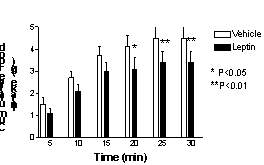| pA2 online © Copyright 2004 The British Pharmacological Society |
015P
University of Buckingham 3th Focused Meeting April 2004 |
|
Effects
of intraperitoneal administration of low microgram doses of leptin
on operant and long-term food intake in rats |
|
We have previously
reported that i.p. administration of low microgram doses of leptin produces
a short lasting decrease in food intake in rats that had been fasted for
between 21 and 22h by a vagally mediated mechanism and suggested that
leptin released from the stomach during a meal may play a role as a short-term
peripheral satiety factor (Patel et al., 2002, 2003). In the present study
we sought to extend these observations by investigating the effects of
i.p. administration of low microgram doses of leptin on (a) operant food
intake in rats that had been fasted for 5h, and (b) food intake in non-deprived
rats measured over a 24h period.
Experiment 1. Male Wistar rats (n=8, b. wt. 380 - 450g) were deprived
of food for 5h per day and trained to press a lever in an operant conditioning
chamber on a fixed ratio 5 (FR-5) schedule for 45 mg food pellets, (Ebenezer,
1992). During experimental trials, the rats were injected i.p. with either
vehicle or leptin (10 µg kg-1)
and placed in the conditioning chamber immediately after injection. Water
was available ad libitum. Food intake was recorded in 5 min bins for 30
min. Each rat received both treatments in a cross over fashion; 3 days
separated successive trials. The cumulative data was analysed by the paired
t-test. Experiment 2. Male Wistar rats (n=8; b wt. 330 - 360g) were housed
in groups of 4 with free access to food and water ( lights on at 9.00h
and lights off at 21.00h). During experimental trials, the rats were injected
i.p. with either saline or leptin (10 or 25 µg kg-1)
at the start of the light cycle and placed singly in separate experimental
cages with free access to food and water, as described previously (Ebenezer,
1990). Cumulative food intake was measured in 30 min time bins over the
24h test period. Each rat receiving all treatments; 3 days separated successive
trials. The data was analysed by ANOVA with repeated measures.
The results from Experiment 1 are illustrated in Fig. 1 and show that
the hypophagic effect of leptin is apparent at short (5h) as well as longer
periods (21 - 22h) of food deprivation. Analysis of the data from Experiment
2 revealed that leptin (10 and 25 µg kg-1)
had no significant effects on cumulative food intake in non-deprived rats
at any of the intervals over the 24h measurement period. For example,
mean cumulative intake (g) ± s.e. mean at 24h was 26.4 ±
3.1 (vehicle), 29.9 ± 1.0 (leptin 10 µg kg-1)
and 29.5 ± 1.2 (leptin 25 µg kg-1).
This is in contrast to the slow-onset but long lasting hypophagic effects
(from 6 - 24h) observed in rodents following s.c. injection of sub-milligram
to milligram doses of leptin, which is elicited by a central effect of
the hormone (see Luheshi et al., 1999). These findings suggest that while
i.p. administration of low microgram doses of leptin produces a brief
(15 - 30 min;) but not long lasting (6 - 24h) hypophagia, and lends support
to the view that leptin may play a role as a short-term peripheral satiety
factor (Patel et al., 2003).

Fig.1. Effects of leptin on operant food intake in 5h fasted rats.
Ebenezer,
I.S. (1990) NeuroReport, 1, 73 - 76.
Luheshi, G.N. et al. (1999) Proc. Natl. Acad. Sci. (USA), 96,
7047 - 7052.
Patel, J.D. et al. (2003) Br. J. Pharmacol. P. in press.
Patel, J.D. et al. (2002) Br. J. Pharmacol., 134, 118P.
Ebenezer, I.S. (1992) NeuroReport, 3, 1019 - 1022.